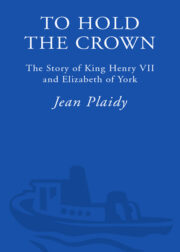“My dear daughter,” he said. “I have good news for you. I have heard from your parents.”
Her face lighted up. They were going to send for her. They would never agree to her marrying young Henry. It was wrong according to the laws of the Church and none could uphold the Church more strongly than her mother. Henry was her brother-in-law. That was the important fact, not that he was five years younger than she was. That meant nothing to them.
The King’s next words dashed her hopes. “They agree to a marriage between you and Prince Henry.”
“But . . . that is . . . impossible. I was his brother’s wife.”
“No, my dear child, the marriage was not consummated. That makes all the difference. All we need is a dispensation from the Pope. And we can rest assured that if I wish it and if your parents wish it there will be no obstacles to that.”
“I . . . I . . . I do not wish . . .”
“I know your feelings. You have so shortly become a widow. You loved Arthur. My dear child, you know nothing of marriage. That will come . . . in due course. You will be betrothed to Henry and when he is of an age to marry the ceremony shall take place. You will be the Queen of England one day.”
“Does Henry know of this?”
“He does and he is overjoyed.”
“He is too young. . . .”
“Nay, he understands well. He was, to confess it, a little jealous of his brother’s good fortune.”
The King’s face was twisted into a smile as he tried to look jovial. Katharine thought it was as though his features resented being distorted into such unusual lines.
“It will be a long time . . . yet,” said Katharine faintly.
“Ah, time passes quickly. It gives me great pleasure to convey to you this excellent news.”
He rubbed his hands together and his eyes glinted.
He is seeing one hundred thousand crowns which have already been paid to him and is congratulating himself that he will not have to part with them, thought Katharine. And he is seeing the hundred thousand coming to me when I marry Henry.
The King put his lips to her cheek and she was dismissed.
In her apartment she called for writing materials.
She wanted to write to her mother but she could not do this. Everything she wrote would be seen by both her parents and she knew her father would be angry if she pleaded with her mother and excluded him.
Nevertheless, she must relieve her feelings in some way.
“I have no inclination for a second marriage in England. . . .”
Her mother would understand that that was a cry for help.
Then she thought of the rules of obedience which had always been adhered to; one must never think of oneself but of the good of the country. If her parents wished it she would have to take Henry. Perhaps they could be happy together; he had always shown an interest in her. She would have to be resigned to her fate if it were her parents’ wish that she should accept what they planned for her.
She added: “I know that my tastes and conveniences cannot be considered, and you will in all things act as is best.”
When she had written and dispatched the letter she lay down on her bed and staring dry-eyed before her murmured: “Please dearest mother, send for me. Dear God, let me go home.”
It was late January when the Queen in the company of her ladies was rowed from Richmond to the Tower where she had decided her child should be born.


"To Hold the Crown: The Story of King Henry VII and Elizabeth of York" отзывы
Отзывы читателей о книге "To Hold the Crown: The Story of King Henry VII and Elizabeth of York". Читайте комментарии и мнения людей о произведении.
Понравилась книга? Поделитесь впечатлениями - оставьте Ваш отзыв и расскажите о книге "To Hold the Crown: The Story of King Henry VII and Elizabeth of York" друзьям в соцсетях.